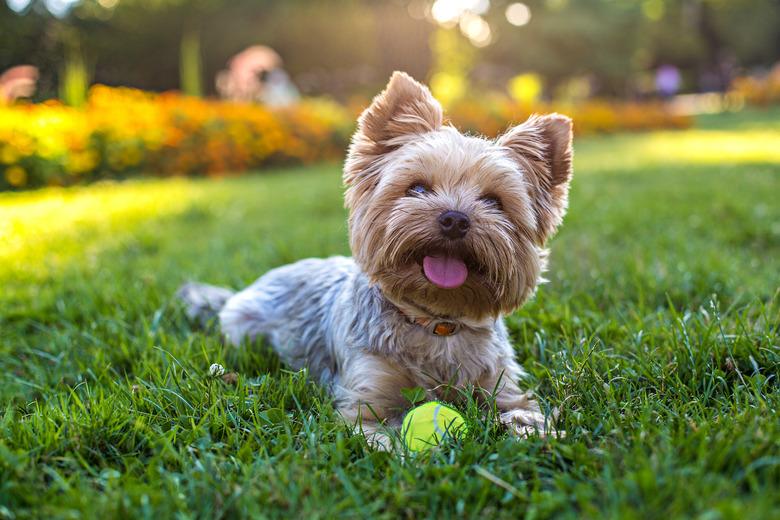The Best Pet Safe Lawn Fertilizer And Weed Control
We may receive a commission on purchases made from links.
You want your yard to look green and lush, but finding pet-safe lawn fertilizer and weed control is also important when you have a furry family member who shares the yard. Weed-killing products, in particular, are often full of toxic chemicals, which can make your pet seriously ill in addition to posing potential risks to you and the environment. Choosing safer options that keep those toxic chemicals out of your yard means your pup can enjoy outdoor spaces without a health risk.
Tip
Manual weed pulling, mulching, vinegar and boiling water are pet-safe weed control methods. The safest fertilizer options are fish emulsion, compost, manure and seaweed.
Manual Weed Control
Manual Weed Control
Grab a sturdy garden hoe and hand-weeding tool for the most pet-safe way to weed your lawn. When manually weeding, pull one weed at a time, gripping it securely at the base to pull up the root system, or use the weeding tools to help remove the plants. The ideal time for pulling weeds is after a rain when the soil is still wet, which makes it easier to pull up the plant, roots and all. You can also use a sprinkler or hose to wet the area if it hasn't rained recently.
Household Weed Killers
Household Weed Killers
Some items you have in your home can help kill weeds growing in your lawn. These options are nonselective, meaning they'll kill any plant life they touch, including the grass you want to keep. Use caution when using these methods and concentrate their use on weeds only. Apply them on a calm day to keep them from blowing onto other plant life.
One option is household vinegar or stronger horticultural or cleaning vinegar with a higher concentration of acetic acid. When applied to weeds, especially young leaves, the vinegar dries them out and kills them. Adding a few drops of dish detergent to the vinegar helps break down the protective coating on the weeds, allowing the vinegar to get to work faster.
Another option is to pour boiling water over the weedy areas. Again, the boiling water will kill any plants it touches, so use with caution in lawn areas. These options can work well if you have a large weedy section of your lawn that you want to clear and reseed. Weeds with taproots, rhizomes, and tubers are more difficult to eradicate with boiling water, because they may re-sprout from the root even after boiling water kills the top growth.
Mulching to Control Weeds
Mulching to Control Weeds
Mulching for weed control is an option in landscaped areas or parts of your yard that are mostly weeds. Applying a thick layer of mulch helps smother out the weeds in those areas. The mulch gives the area a cleaner, finished look compared to weedy patches of grass. Mulch can also be a good alternative in parts of your lawn where grass doesn't grow well.
Avoid cocoa mulch in any areas where your pets can go. While beneficial for soil, this type of mulch is toxic to dogs since it's made of cocoa bean shells. It can have the same effect as your dog eating chocolate candy, including digestive issues, vomiting, increased heart rate, tremors, seizures and even death.
Lawn Fertilizer Dangers
Lawn Fertilizer Dangers
Unlike synthetic weed killers, which may contain toxic chemicals, some fertilizers are made with natural components. Their composition means that fertilizers are generally less of a risk than weed killers. However, if your pet ingests fertilizer, it could cause digestive issues or more serious issues.
Even organic fertilizers, such as bone meal, blood meal and fish meal, can be dangerous, especially if you combine them with insecticides. Some of these fertilizers congeal in your dog's stomach or cause other digestive problems. These types of soil amendments often smell good to dogs, which might encourage them to eat even more, increasing the risk of a reaction.
Some fertilizer components, even natural elements, can cause potentially serious side effects for your pet. Fertilizer with iron can cause iron poisoning in your dog. Some fertilizers also contain insecticides, such as carbamates and organophosphates, which can be life-threatening to your pets. Avoid any fertilizers with these components.
Pet-Safe Lawn Fertilizer
Pet-Safe Lawn Fertilizer
Manure, compost, seaweed and fish emulsion are some pet-friendly options for fertilizing your lawn and garden. If you use a commercial fertilizer, choose a lawn fertilizer with only the necessary ingredients based on your needs, avoiding any fertilizer with iron, carbamates and organophosphates. Skip any combination products with weed killers or insecticides, which often mean potentially toxic chemicals are in the mix.
When applying fertilizer, always read and follow all package instructions for safety. Check the package for a recommended time period to keep pets and humans off the grass and ensure your pets don't go on the lawn within that period. Store your leftover fertilizer in a secure spot with the bag closed tightly. Eating a large amount of fertilizer directly from the package can be dangerous for pets, even if the ingredients are derived from organic sources.
